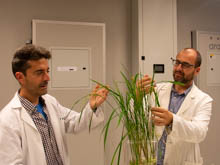The new biofertilizers, developed at the Institute of Plant Biochemistry and Photosynthesis by doctors Vicente Mariscal and Fernando Publio Molina, are formulated based on strains of atmospheric nitrogen-fixing cyanobacteria, native to the Lower Guadalquivir region, enhancing the cyanobacteria’s capacity to fix atmospheric nitrogen and the release of nitrogen fixed to the plant.
These biofertilizers reduce the use of chemically synthesized nitrogen fertilizers.
These new biofertilizers increase rice production, significantly reducing the use of chemically synthesized nitrogen fertilizers. The development of these new biofertilizers will allow us to find more natural, economic and ecological alternatives to the use of nitrogen fertilizers for plants, a fact that will have an enormous positive impact on highly vulnerable areas in Andalusia, such as the Guadalquivir estuary and the Doñana National Park.
The work is being carried out in collaboration with the Second Degree Cooperative Agroquivir and is subsidized by the Technological Corporation of Andalusia.
You can listen to the radio interview conducted by RTVA with Dr. Vicente Mariscal at this link.
We also include the video recorded for the series “I investigate” by the CSIC Delegation in Andalusia.
Los nuevos biofertilizantes, desarrollados en el Instituto de Bioquímica Vegetal y Fotosíntesis por los doctores Vicente Mariscal y Fernando Publio Molina, están formulados a base de estirpes de cianobacterias fijadoras de nitrógeno atmosférico, autóctonas de la región del Bajo Guadalquivir, potenciando la capacidad de fijación de nitrógeno atmosférico de las cianobacterias y la liberación de nitrógeno fijado a la planta.



